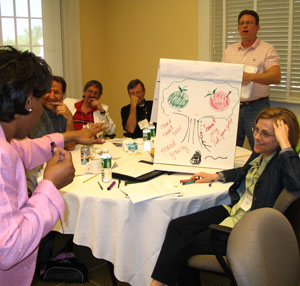Services
Leadership and Psychological Assessment Tools
At FastTrack, we use the most highly respected psychological assessment tools available—each a valid and reliable, scientifically sound measure. These can be used to build a program tailored to meet the needs of you or your organization.
Myers Briggs Type Indicator Steps I and II:
The Myers Briggs Type Indicator explains psychological type and innate preferences for four aspects of personality: orientation to the outer world, data gathering, decision making, and lifestyle. This "grandfather of all leadership assessment tools" is the most commonly used leadership development instrument and has the greatest amount of validating research behind it. It contributes to developing a "leadership language" for organizations and provides an insightful tool to understanding how to connect and communicate with others.
Fundamental Interpersonal Relationship Orientation-Behavior (FIRO-B):
FIRO-B provides insight on how one's behaviors are "read" by others in organizations. It can help explain issues of miscommunication as well as personal connectedness to the organization itself, the team, and the group's objectives. This instrument assesses behaviors around including others, control, and expressing support or affection and helps participants identify their significant personal motivators. Because of its demonstrated usefulness, this is the second most commonly used instrument in high-level leadership training.
Bar-On EQi 2.0 (Emotional Intelligence):
Bar-On EQi 2.0 directly addresses the "soft skills" component of leading, managing, and working with others. The EQi 2.0 compares responses to the general population's behaviors in attending to the emotional patterns that influence one's ability to succeed in coping with environmental demands and pressures.
The Change Style Indicator:
The Change Style Indicator describes three main styles of dealing with change (conserver, pragmatist, or originator) and identifies the preferred change style of the participant. The debrief session discusses how to understand and communicate with others of differing change style orientations and how to successfully sell the change message to stakeholders.
360-Feedback Survey:
The Discovery Learning 360 is a well-respected business-based instrument that gathers input from up to 18 stakeholders (boss/supervisor, peers, direct reports, and others) on 40 different critical skills in organizational management and leadership. The instrument also captures qualitative input on 5 questions specific to the your development or organizational goals.
The Thomas Kilman Conflict Instrument:
Conflict presents both crisis and opportunity. This session presents feedback on your use of the five most common styles of dealing with conflict. We work with participants to explore how each of those can be useful-and limiting-to the individual and the organization. Coaching and workshops address building skills in these areas and identifying which style is appropriate for different situations.
The CPI 260:
The California Psychological Inventory instrument measures personality attributes commonly used to describe people, and from participants’ self-ratings accurately describes them as if they had been described by others who know them well. The CPI instrument reveals your client’s approach to life and work and provides a measure of his or her degree of development and maturity. The Coaching Report for Leaders: less results from the CPI 260 are re-scaled to compare to successful leaders and managers. See how your leadership behaviors stack up against those who have survived the many challenges of both the public and the private sector
FourSight:
With a FourSight, individuals, teams or organizations can discover their problem-solving preferences. FourSight is designed to boost critical and creative problem solving skills in individuals and groups. The ability to understand and leverage thinking styles is the first step toward achieving consistent breakthrough results.
Decision Style Profile:
The Decision Style Profile empowers leaders to make better decisions by enlightening them on how to choose the most effective and appropriate decision-making styles for given situations. Each participant is asked how he or she would make several real-world business decisions. A personalized report compares the participant’s chosen decision-making styles to the most appropriate styles. The Decision Style Profile evaluates the appropriateness with which participants include others in the decision-making process, as well as the extent to which participants consider critical decision factors in their decision-making processes.
Simulations
Our simulation exercises teach real-time learning in ways that separate performance, teamwork, innovation and communication challenges from the turf issues that can cloud underlying performance problems.
The Paper Planes Simulation:
Paper Planes, Inc. helps participants experience the powerful effects of system reengineering and process improvement, gain first-hand knowledge about the cost and waste inherent in a dysfunctional system, recognize barriers to change, develop new paths to continuous improvement, see the impact of redesign and reengineering on quality, perceive the critical connection between systems thinking, total quality, and customer orientation.
The Managing Difficult Conversations Simulation:
Lets participants practice the skills needed to weather the difficult converstaions they inevitably have.
The Organization Workshop:
The Organization Workshop helps participants see new possibilities for increasing their influence and effectiveness as well as how to increase the vitality and success of their organization. People will come away with an appreciation for the difficult issues faced by people in other parts of the organization, and with greater understanding of themselves in their multiple roles as Tops, Middles, Bottoms, and Customers. Participants will see the path to using more emotional intelligence and being more strategic in their interactions with others.
The Selling Change Exercise:
Research shows that convincing people to change by telling them the facts is one of the least effective methods of persuasion. This exersize lets participants learn and practice how to more effectively sell their ideas to others who may not agree with their point of view.

